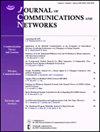Towards 6G hyper-connectivity: Vision, challenges, and key enabling technologies
IF 2.9
3区 计算机科学
Q2 COMPUTER SCIENCE, INFORMATION SYSTEMS
引用次数: 0
Abstract
Technology forecasts anticipate a new era in which massive numbers of humans, machines, and things are connected to wireless networks to sense, process, act, and communicate with the surrounding environment in a real-time manner. To make the visions come true, the sixth generation (6G) wireless networks should be hyper-connected, implying that there are no constraints on the data rate, coverage, and computing. In this article, we first identify the main challenges for 6G hyperconnectivity, including terabits-per-second (Tbps) data rates for immersive user experiences, zero coverage-hole networks, and pervasive computing for connected intelligence. To overcome these challenges, we highlight key enabling technologies for 6G such as distributed and intelligence-aware cell-free massive multi-input multi-output (MIMO) networks, boundless and fully integrated terrestrial and non-terrestrial networks, and communication-aware distributed computing for computationintensive applications. We further illustrate and discuss the hyper-connected 6G network architecture along with open issues and future research directions.迈向6G超连接:愿景、挑战和关键使能技术
技术预测预示着一个新时代,在这个时代,大量的人、机器和事物连接到无线网络,以实时方式感知、处理、行动并与周围环境通信。为了实现这些愿景,第六代(6G)无线网络应该是超连接的,这意味着在数据速率、覆盖率和计算方面没有限制。在本文中,我们首先确定了6G超连通性的主要挑战,包括用于沉浸式用户体验的每秒万亿比特(Tbps)数据速率、零覆盖漏洞网络以及用于连接智能的普适计算。为了克服这些挑战,我们强调了6G的关键使能技术,如分布式和智能感知的无蜂窝大规模多输入多输出(MIMO)网络、无边界和完全集成的地面和非地面网络,以及用于计算密集型应用的通信感知分布式计算。我们进一步阐述和讨论了超连接6G网络架构,以及悬而未决的问题和未来的研究方向。
本文章由计算机程序翻译,如有差异,请以英文原文为准。
求助全文
约1分钟内获得全文
求助全文
来源期刊
CiteScore
6.60
自引率
5.60%
发文量
66
审稿时长
14.4 months
期刊介绍:
The JOURNAL OF COMMUNICATIONS AND NETWORKS is published six times per year, and is committed to publishing high-quality papers that advance the state-of-the-art and practical applications of communications and information networks. Theoretical research contributions presenting new techniques, concepts, or analyses, applied contributions reporting on experiences and experiments, and tutorial expositions of permanent reference value are welcome. The subjects covered by this journal include all topics in communication theory and techniques, communication systems, and information networks. COMMUNICATION THEORY AND SYSTEMS WIRELESS COMMUNICATIONS NETWORKS AND SERVICES.

 求助内容:
求助内容: 应助结果提醒方式:
应助结果提醒方式:


